This past week my wife and I traveled to DC to experience our first AIPAC conference, and wow, what an experience it was! We started off with a visit to the National Gallery of Art, and even there we met some friends that were headed to AIPAC:
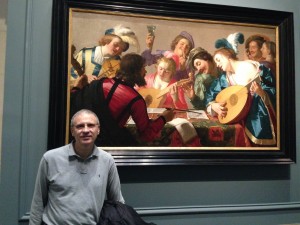 First, you have to try and imagine the size and scope of the AIPAC conference. It must have been one of the largest Jewish gatherings outside of Israel in history. 15,000 people in one giant football-field-sized auditorium! Just for comparison, that is 3 times the size of the URJ Biennial, which is the premier event of the Reform movement. It is roughly equal to the entire current Jewish population of Denmark and Austria combined!
First, you have to try and imagine the size and scope of the AIPAC conference. It must have been one of the largest Jewish gatherings outside of Israel in history. 15,000 people in one giant football-field-sized auditorium! Just for comparison, that is 3 times the size of the URJ Biennial, which is the premier event of the Reform movement. It is roughly equal to the entire current Jewish population of Denmark and Austria combined!
Here is the lower level of the Washington Convention Center which was called “AIPAC Village” and included lunch areas, a book store, demos of various Israeli companies, and various educational, entertainment and social activities: 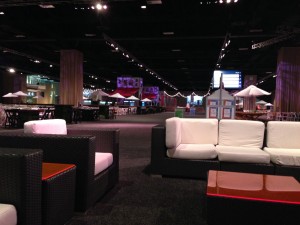
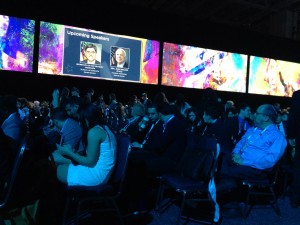
And here is the main auditorium during some of the keynote speaker features:
All 15,000 people took 2-3 days of vacation from work or school or time off their spring break, paid a registration fee (there are discounts available), paid for travel, hotel and meals, and braved a winter storm that shut down the Government and DC public schools, just to spend 3 days supporting Israel. Many came with their spouses, some with their kids and some with their parents. There were many first-timers like us, but also many who told me they have been coming for 10 years or more! I am warning you: once you go, you will not be able to stop. My wife and I already registered for the AIPAC 2015 conference.
Diversity Everywhere
My personal impression of the policy conference was that the name of the game was diversity and balance.
There was diversity in age groups: retired couples, working people, 2,300 students (!), and quite a few families with kids in high school. Here is a touching story of a campus activist whose late father left her a legacy of pro-Israel advocacy:
Diversity of origin: there were many non-Jewish attendees, both students and adults, including many blacks and hispanics.
Diversity in belief: there were secular, reform, conservative and orthodox Jews, 500 male and female Rabbis of all denominations, as well as minsters and other Christians and Muslims. There were Americans from all 50 states, and all walks of life.
Here are Rabbi Rick Jacobs (Reform), Rabbi Steve Weil (Orthodox) and Rabbi Steven Wernick (Conservative) proving that Israel continues to be a unifying rather than dividing theme among American Jews:
There was also diversity of opinion. The media tries to make it sound like AIPAC speaks with a single voice, but nothing could be further from the truth. AIPAC is actually made up of only about 300 employees, and the rest are just plain citizen activists who feel strongly about supporting Israel. To my delight, everyone I met between the lectures was extremely well-informed and eager to debate and exchange ideas. Many had been to Israel more than once, and many were professional or lay leaders in their communities. I was very impressed with the people I met, and how easy it was to make friends. We even met some people on the Amtrak train on our way from NYC to DC, and ended up running into them a few more times and exchanging emails. The same thing happened at the hotel and during lunch breaks. Just saying to someone: “Hi, where are you from?” was usually enough to start a half-hour conversation that formed a bond.
On the partisan front, there was complete diversity of parties and opinions. For example, senators McCain (R) and Menendez (D) spoke in support of passing a new round of sanctions legislation against Iran as a precaution in case the talks fail, while Secretary of State John Kerry and Treasury Secretary Jacob Lew opposed additional sanctions while talks are underway. The speakers from Israel were also diverse. While Prime Minister Netanyahu’s speech grabbed the media headlines, there was also an extensive interview with the leader of the opposition Labor Party Isaac “Buji” Herzog:
Dr. Massad Barhoum, the medical director of the Western Galilee Medical Center, one of three Israeli hospitals to treat Syrians wounded in that country’s civil war told the audience about his experience as an Arab Israeli doctor treating wounded Syrians:
Former Senator Rudy Boschwitz and Rev. Dr. DeeDee Coleman spoke about AIPAC’s role in rescuing Ethiopian Jews from genocide in 1991:
One of the most memorable moments came about when AIPAC Campus Activist Lindy Mabuya, who came to the US from South-Africa in 2009, spoke about how she was horrified to hear that Israel is being accused of Apartheid. As someone who grew up in that regime, she knew this was a blatant lie, and attending an AIPAC policy conference not only convinced her, but turned her into a pro-Israel activist and an activist for her own country:
Another amazing female black Christian activist is Chloe Valdary who made headlines in some recent articles after being attacked for being a mindless puppet controlled by the dark forces of AIPAC. Chloe is interviewed here during the conference. Make up your own mind:
Breakout Sessions
The real meat of the conference for me were the break sessions. These were two-hour chunks of time throughout the day where you could choose any one of 10-15 different sessions in parallel, each offering an in-depth analysis of one specific topic related to Israel, usually comprised of a panel of 2-3 speakers offering different points of view.
The main problem was how to choose. There were so many great speakers and great topics that it was a really tough choice. Just to give you a sampling of the topics: there were sessions on Russia, Iran, Syria, Jordan, Egypt, Lebanon, etc. There were sessions on BDS and previous Arab boycotts. There were sessions on Israeli politics, the IDF, minority rights in Israel, etc. There were many sessions on the Palestinians, Hamas and the peace process. There were introductory sessions on the history of Zionism and the conflict, and the list goes on and on.
Some of the session speakers included Israeli military analyst Ron Ben Yishai, Dennis Ross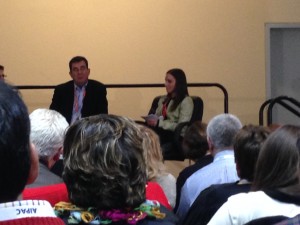 , Palestinian activist Gaith al-Omari, David Pollock, Yossi Klein Halevi spoke about his new book Like Dreamers, Aaron David Miller, Avi Dichter who appeared in the film Gatekeepers, and so many more.
, Palestinian activist Gaith al-Omari, David Pollock, Yossi Klein Halevi spoke about his new book Like Dreamers, Aaron David Miller, Avi Dichter who appeared in the film Gatekeepers, and so many more.
One of the sessions I found most interesting was a panel on Israeli public opinion which hosted Ari Shavit:
Although I did not think much of his recent book My Promised Land (for reasons I will explain in another post), I did find myself agreeing with most of what he said in the session. He spoke extensively about Israel needing to regain the moral high-ground, and that announcing new settlement projects, while not necessarily an impediment to peace, weakens Israel’s moral position. He spoke strongly against a one-state solution, and his argument was one word: Syria. That’s what a one-state solution would look like. On the other hand, he supports the requirement for the Palestinians to recognize Israel as a Jewish state because, he argued, “that’s all they can really give us in return – their acceptance of our presence in the middle east”.
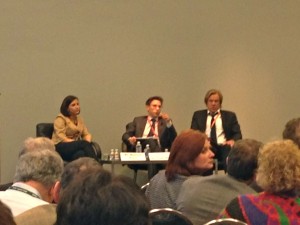 Another fascinating session was about trends in public opinion in the West Bank and Gaza. Jonathan Schanzer spoke about his new book State of Failure, and analyzed the flow of money to the Hamas and why the closing of the tunnels by Egypt has brought Hamas to the brink of bankruptcy.
Another fascinating session was about trends in public opinion in the West Bank and Gaza. Jonathan Schanzer spoke about his new book State of Failure, and analyzed the flow of money to the Hamas and why the closing of the tunnels by Egypt has brought Hamas to the brink of bankruptcy.
One of the most educational sessions for me was “Israel in the Courtroom: the challenges of the international legal landscape”, which included AIPAC legal analyst Keath Blatt, Marlene Mazel from the Israel Ministry of Justice, and Gavi Mairone from MM Law LLC. They spoke about the legal actions taken against Israel in international courts, how Israel is responding defensively, and what measures Israel is taking to fight back offensively. At some point, the speaker asked how many lawyers were in the room, and nearly 100 hands went up…
A very moving session was “Civilian Coexistence: People-to-People efforts in resolving the Israeli Palestinian 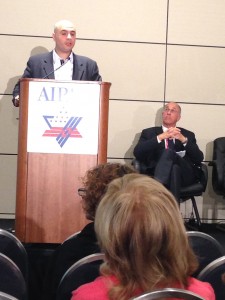 Conflict”. The first speaker was Yarden Leal-Yablonka of the Peres Center for Peace, who spoke about the many programs they sponsor to bring together Israeli and Palestinian youth and adults. Ali Waked, an Israeli Arab filmmaker who co-wrote the new movie Bethlehem and helped found Merchavim, spoke about the challenges of Arabs in Israeli society. This was a very difficult talk, as he spoke both of progress made, but also very harshly of prejudice and separatism against Arabs that still exists in Israeli society. Many of the people who stood up to ask questions commended him on his courage and honesty.
Conflict”. The first speaker was Yarden Leal-Yablonka of the Peres Center for Peace, who spoke about the many programs they sponsor to bring together Israeli and Palestinian youth and adults. Ali Waked, an Israeli Arab filmmaker who co-wrote the new movie Bethlehem and helped found Merchavim, spoke about the challenges of Arabs in Israeli society. This was a very difficult talk, as he spoke both of progress made, but also very harshly of prejudice and separatism against Arabs that still exists in Israeli society. Many of the people who stood up to ask questions commended him on his courage and honesty.
The final speaker of that session was Robi Damelin of The Parents Circle: a forum of bereaved Israeli and Palestinian families who work together towards 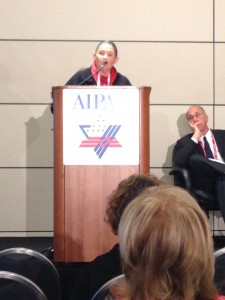 reconciliation. Robi lost her 29-year old son David in 2002, and through this organization has decided to channel her grief and pain into an effort to reconcile and inspire others to do the same. She strongly
reconciliation. Robi lost her 29-year old son David in 2002, and through this organization has decided to channel her grief and pain into an effort to reconcile and inspire others to do the same. She strongly 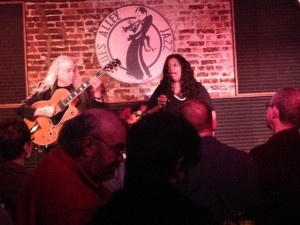 believes that a process of reconciliation, humanization and recognition of each other’s suffering is critical to the success of any peace agreement.
believes that a process of reconciliation, humanization and recognition of each other’s suffering is critical to the success of any peace agreement.
In the evening, there were some organized events, but my wife and I decided to take a break and head over to the Blues Alley Jazz Club in Georgetown to see the amazing duo of Tuck & Patti:
Back at the plenary sessions, one of the most entertaining laugh-out-loud interviews was Times of Israel editor David Horovitz interview with Yossi Vardi, the “grandfather” of Israeli hi-tech:
Ofra Strauss (the CEO of Strauss Food Industries in Israel) told the audience how the US is rapidly becoming the largest manufacturer of Hummus (!) in the world thanks to a joint venture of Strauss and Pepsi opening Sabra Hummus plants in Virginia, where famers are now growing chick peas instead of Tobacco (around 3:00 minutes in):
The Innovation Showcase featured three Israeli companies that are poised to have a powerful positive impact on the lives of Americans by bringing new technology to brain research, law enforcement and water resource management:
and finally, Pastor Chris Harris told the story of how he was inspired by what he saw in Israel to bring healing and support to his own community in Chicago. Make sure to watch the video all the way to the end to see how he got the whole crowd on its feet:
You can find the rest of the AIPAC conference videos here.
Lobbying? Maybe Next Year…
At the end of the conference, many of the attendees continued on to the Hill to lobby. I had not signed up for lobbying as I had no idea what it entailed. However, everyone I spoke to kept telling me what a great and empowering experience it is. So, I guess it’s something to look forward to next year…I hope to see you there.
